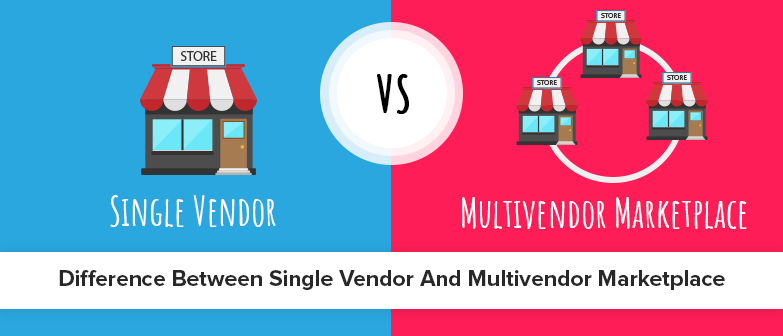

Introduction
Online marketplace platforms play a crucial role in customers’ shopping process. For every businessman, it has become an easy tool to reach a huge audience. Entrepreneurs start investing in building an online marketplace software for their business by seeing the tremendous growth and customers’ response.
Now the main query is whether to sell their own products alone or club with other sellers and sell their products. The former is termed as a single vendor marketplace and the latter is termed as a multi vendor ecommerce platform. This is a tricky decision that any user will struggle with. To make it simple, we have given a clear picture of the advantages and disadvantages of both types.
The single vendor marketplace platform
A platform that sells particular brand products alone is termed to be a single vendor marketplace. The person who owns the brand will run the platform and will sell his products to multiple customers. This type of platform has only two entities. One will be the seller also called the admin of the platform and another will be the customer.
Features of a single vendor marketplace platform
- Provide a fully customizable platform that will make the seller have his complete business plan be implemented in the marketplace.
- Easy to add new sales channels that will increase the conversion and get better returns.
- Add and edit unlimited products of the same brand.
- Process orders with an effective order management system.
- An advanced inventory control system that will notify the seller when the stock goes below the minimum value.
- Proper sales and revenue tracking system that will provide multiple reports about the performance of the platform.
- A reliable customer feedback system that will get customers’ opinions about the product and the platform services.
Advantages of a single vendor eCommerce platform
- Low cost – building a single vendor eCommerce platform doesn’t require a huge budget as the features and functionalities are limited. Any startup can easily start a single vendor platform with less investment.
- High level of compatibility – the single vendor marketplace approach provides better compatibility between the seller and the customer. This will have a major impact on sales and conversion.
- Easy communication – as there will be a single vendor, customers can easily get in touch with him and there will not be a long process to communicate with the seller.
Disadvantages of a single vendor eCommerce platform
- Customer acquisition is less – by just offering a single brand, it is very difficult to get more audience to your platform and customers will always want a wide range of options. They will not stick to a particular brand.
- Promoting the platform – being a single vendor store, the seller needs to take the complete responsibility of promoting the brand. More investment is needed for marketing and promotion.
- Inefficient stock management – the admin needs to manage stock and should always keep enough stock. So, more production is needed and that will require more budget.
The multi-vendor marketplace platform
This business model is entirely different. In this model, multiple sellers will be connected and their products will be displayed on this platform. Customers will search and find products and will select the seller and will place orders. The admin will receive the payment and will deduct his commission and will settle the amount to the concerned seller.
Three entities are involved in this business model, they are the admin, the seller, and the customer. The leading industries that commonly follow multivendor marketplace solutions are the grocery industry, service industry, food delivery industry, and many more. Let us check out the cool features of multi-vendor marketplace software.
Features of a multi-vendor eCommerce platform
- Advanced search & filter option – let your audience easily find products they search for and let them be directed to the product page with few clicks.
- Easy product management – support your sellers by offering better product management options that will help to add, edit and manage their products.
- Effective fulfillment and delivery – properly handle all orders and arrange for reliable shipping. Let your customers track their orders in real-time and get to know their order status.
- Multiple payment options – integrate your multi-vendor platform with multiple payment gateways that will facilitate buyers to pay and buy products online without hesitation.
- Better analytics and reporting – your multi-vendor marketplace software should support you with advanced analytics and better reporting. This will help you to understand the working function of your marketplace platform and you can measure its performance easily.
- SEO-friendly – to gain easy online visibility, your multi-vendor platform should be search engine optimized so that it will get easy search engine page rankings. This will obviously increase your multi-vendor website traffic and assure better conversion.
- Customization and scalability – the platform should be flexible for users to suit their business purpose. You should offer enough options to customize the platform. Also, your platform should be perfectly scalable and support massive data.
Advantages of a multi-vendor eCommerce platform
- Easy traffic gain – since the platform holds multiple sellers, audiences are easily attracted towards the platform and your multi-vendor website will get better traffic that will lead to better order conversion.
- No inventory maintenance – there is no headache in maintaining stock when you run a multi-vendor marketplace platform. All inventories are maintained by sellers and you may not worry about them.
- Multiple revenue streams – the multi-vendor platform supports multiple revenue channels like commission fee, subscription fee, advertisements, affiliates, and many more. The profit margin is high with multi-vendor software.
- Inbuilt marketing tools – every multi-vendor platform will have inbuilt marketing tools that will support branding and promotion. Users may not spend much on marketing as they get easy brand recognition.
Disadvantages of a multi-vendor eCommerce platform
- Complexity – launching a best online marketplace software is not an easy joke. More features and functionalities should be integrated and this is quite a time-consuming process.
- High cost – users can go for a ready-made solution for building a multi-vendor platform and that can be cost-effective but still many more advanced modules need to be purchased to make the platform function smoothly.
- Frequent product upgrades – as the multi-vendor marketplace supports thousands of sellers, the platform will need to upgrade products frequently and this is really a headache.
Conclusion
There are many more differences between a single vendor marketplace and a multi-vendor marketplace. One needs to analyze his business requirements and should plan accordingly. Both have their own significance and if you use it wisely then you can get better profit.






